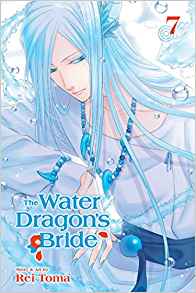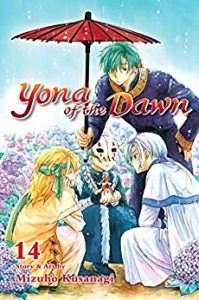Water Dragon’s Bride, Volume 7 by Rei Toma
I suspected that when the Water Dragon God sent Asahi home, she wouldn’t stay there long, and that was definitely the case. She struggles to feel at home back in her own world, with a younger brother that she’s meeting for the first time, and her parents, especially her mother who desperately missed her. This brief story line shows how The Water Dragon’s Bride is a story of a family tragedy, in addition to exploring how human rules fight for power and resources. Asahi misses her old life, but back in the realm of the Water Dragon God, the young king is struggling with drought and the idea that he’s lost the favor of the heavens since Asahi’s disappearance. Subaru even attempts to intervene with the Water Dragon God in Asahi’s absence. When the Water Dragon God does intervene, in his cold and calculated way, Subaru reflects that Asahi was incredibly powerful to make a god change.
Asahi’s disarming way of talking with both the Water Dragon God and Subaru show that she doesn’t regret her choice to leave her family behind, and the way the Water Dragon God is actually able to articulate his emotions and even show a sliver of a smile shows how far he’s become from a god who would dispassionately watch a human starve. While so far the elemental gods that we’ve seen seem content to observe and occasionally make some cutting observations to the Water Dragon God, now that Asahi has returned the next storyline for this series looks like it will be even darker than before. When will hte suffering end????
I’m delighted to keep reading this manga, but there was such a great artistic leap for Toma between Dawn of the Arcana and Water Dragon’s Bride (which makes sense given when they were released in Japan), I’m also extremely curious to see other series of hers.





Recent Comments